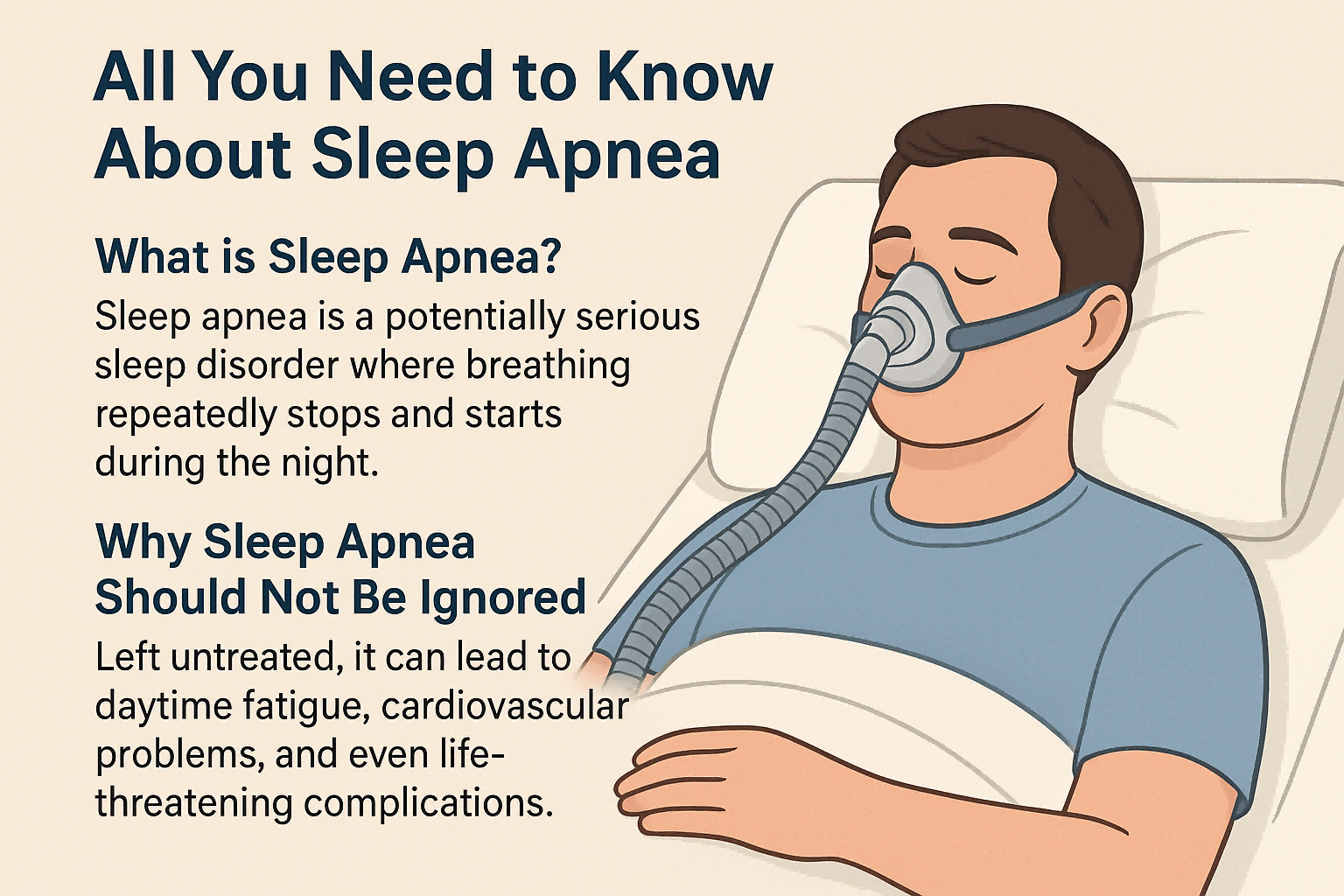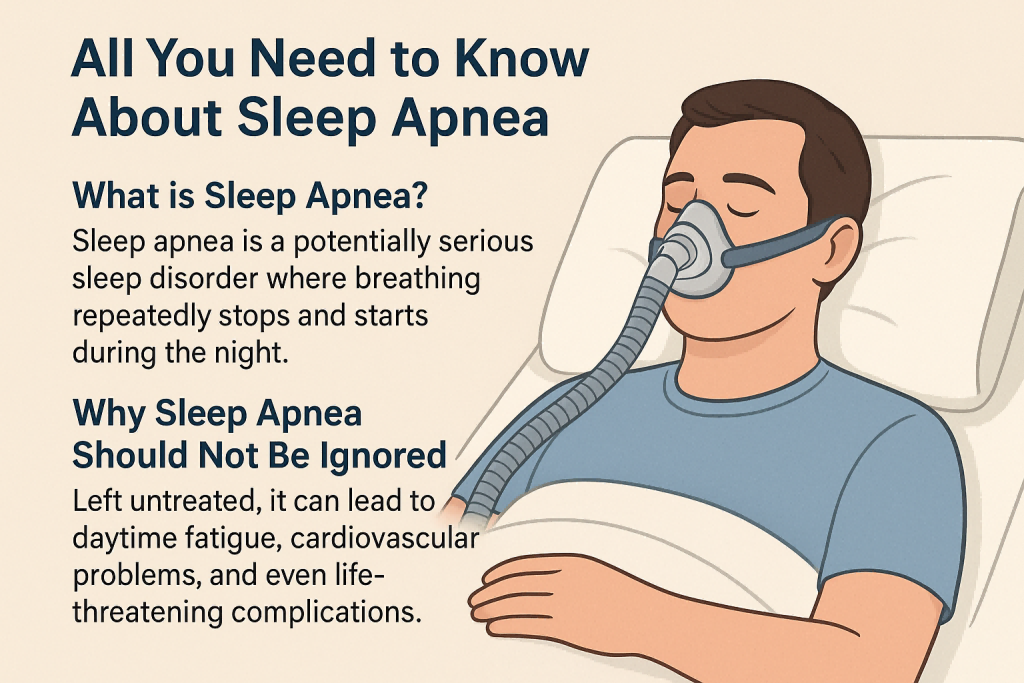All You Need to Know About Sleep Apnea: Causes, Symptoms, Treatments, and Risks


Sleep is the body’s natural way of recharging, but for millions worldwide, a hidden condition interrupts this vital process. That condition is sleep apnea, a potentially serious sleep disorder where breathing repeatedly stops and starts during the night. Left untreated, it can lead to daytime fatigue, cardiovascular problems, and even life-threatening complications.
In this comprehensive guide, you’ll discover everything about sleep apnea—its causes, symptoms, diagnosis, treatment options, and lifestyle changes to manage it effectively.
Types of Sleep Apnea
Obstructive Sleep Apnea (OSA)
This is the most common form, caused when throat muscles relax and block the airway. Snoring is often the first sign of OSA.
Central Sleep Apnea (CSA)
CSA happens when the brain fails to send proper signals to the muscles controlling breathing. Unlike OSA, it’s not due to airway blockage but a communication issue between the brain and respiratory system.
Complex Sleep Apnea Syndrome
Sometimes referred to as mixed sleep apnea, this condition occurs when both OSA and CSA are present.
Causes and Risk Factors
Anatomical Causes
A narrow airway, enlarged tonsils, or nasal congestion can increase the likelihood of sleep apnea.
Lifestyle and Behavioral Factors
Obesity, smoking, and heavy alcohol use are major contributors.
Age, Gender, and Genetic Predisposition
Men are at higher risk than women, and the risk increases with age. Family history also plays a role.
Common Symptoms of Sleep Apnea
Daytime Symptoms
- Excessive daytime sleepiness
- Difficulty concentrating
- Morning headaches
Nighttime Symptoms
- Loud, chronic snoring
- Gasping or choking during sleep
- Restless sleep
Long-Term Health Risks
If ignored, sleep apnea may contribute to high blood pressure, diabetes, heart attack, and stroke.
How Sleep Apnea is Diagnosed
Doctors often recommend a sleep study (polysomnography), where brain activity, breathing patterns, and oxygen levels are monitored overnight. In some cases, home sleep apnea testing provides a convenient alternative.
Treatment Options for Sleep Apnea
Lifestyle Modifications
Losing weight, avoiding alcohol, and improving sleep hygiene can reduce symptoms.
CPAP Therapy
Continuous Positive Airway Pressure (CPAP) is the gold standard treatment. It keeps airways open using gentle air pressure.
Oral Appliances
Special dental devices reposition the jaw and tongue to keep the airway open.
Surgical Treatments
In severe cases, surgery may be recommended to remove excess tissue or realign the airway.
Lifestyle Changes to Manage Sleep Apnea Naturally
- Maintain a healthy weight through diet and exercise.
- Sleep on your side instead of your back.
- Avoid sedatives, alcohol, and smoking as they relax airway muscles.
Complications if Sleep Apnea is Left Untreated
- Cardiovascular problems such as hypertension and heart disease.
- Cognitive decline and increased risk of depression.
- Higher accident risk due to daytime sleepiness.
Sleep Apnea in Children vs. Adults
Children can also suffer from sleep apnea, often due to enlarged tonsils or adenoids. Symptoms may include hyperactivity, poor school performance, and restless sleep. Unlike adults, children may benefit greatly from surgical removal of tonsils.
FAQs About Sleep Apnea
Q1: Can sleep apnea be cured permanently?
Some cases improve with weight loss or surgery, but ongoing management is usually required.
Q2: Is CPAP therapy safe for long-term use?
Yes, CPAP is safe and effective when used consistently.
Q3: How do I know if I have sleep apnea?
If you snore loudly, wake up gasping, or feel extremely tired despite sleeping, you may need a sleep study.
Q4: Can losing weight reverse sleep apnea?
In many cases, yes—especially for those with obesity-related apnea.
Q5: Is surgery the best option for severe cases?
It depends on the cause. Surgery is considered when CPAP and oral appliances aren’t effective.
Q6: Can children outgrow sleep apnea?
Yes, especially if it’s caused by enlarged tonsils or adenoids and treated surgically.
Conclusion
Sleep apnea is more than just a snoring problem—it’s a serious health condition that can impact every aspect of life. Early diagnosis and proper treatment are crucial to restoring healthy sleep and preventing long-term complications. With lifestyle changes, medical interventions, and awareness, managing sleep apnea is not only possible but also life-saving.
📌 For more detailed information, you can visit the American Academy of Sleep Medicine.
















